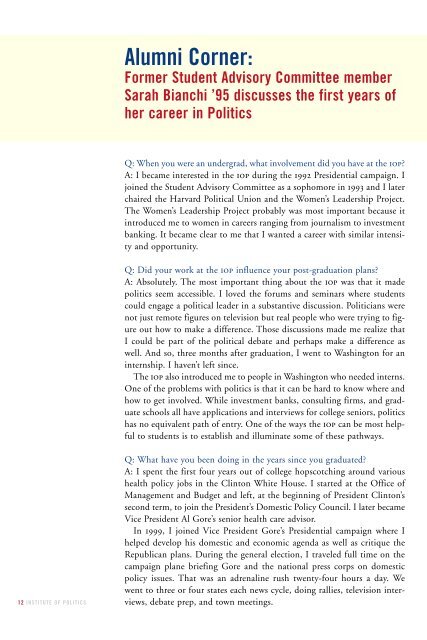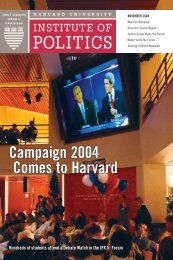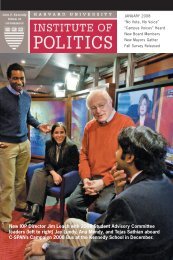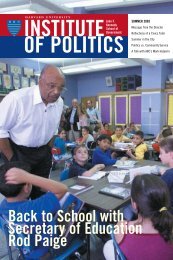2002 Fall Newsletter - Harvard University Institute of Politics
2002 Fall Newsletter - Harvard University Institute of Politics
2002 Fall Newsletter - Harvard University Institute of Politics
- No tags were found...
Create successful ePaper yourself
Turn your PDF publications into a flip-book with our unique Google optimized e-Paper software.
Alumni Corner:Former Student Advisory Committee memberSarah Bianchi ’95 discusses the first years <strong>of</strong>her career in <strong>Politics</strong>Q: When you were an undergrad, what involvement did you have at the IOP?A: I became interested in the IOP during the 1992 Presidential campaign. Ijoined the Student Advisory Committee as a sophomore in 1993 and I laterchaired the <strong>Harvard</strong> Political Union and the Women’s Leadership Project.The Women’s Leadership Project probably was most important because itintroduced me to women in careers ranging from journalism to investmentbanking. It became clear to me that I wanted a career with similar intensityand opportunity.Q: Did your work at the IOP influence your post-graduation plans?A: Absolutely. The most important thing about the IOP was that it madepolitics seem accessible. I loved the forums and seminars where studentscould engage a political leader in a substantive discussion. Politicians werenot just remote figures on television but real people who were trying to figureout how to make a difference. Those discussions made me realize thatI could be part <strong>of</strong> the political debate and perhaps make a difference aswell. And so, three months after graduation, I went to Washington for aninternship. I haven’t left since.The IOP also introduced me to people in Washington who needed interns.One <strong>of</strong> the problems with politics is that it can be hard to know where andhow to get involved. While investment banks, consulting firms, and graduateschools all have applications and interviews for college seniors, politicshas no equivalent path <strong>of</strong> entry. One <strong>of</strong> the ways the IOP can be most helpfulto students is to establish and illuminate some <strong>of</strong> these pathways.12 INSTITUTE OF POLITICSQ: What have you been doing in the years since you graduated?A: I spent the first four years out <strong>of</strong> college hopscotching around varioushealth policy jobs in the Clinton White House. I started at the Office <strong>of</strong>Management and Budget and left, at the beginning <strong>of</strong> President Clinton’ssecond term, to join the President’s Domestic Policy Council. I later becameVice President Al Gore’s senior health care advisor.In 1999, I joined Vice President Gore’s Presidential campaign where Ihelped develop his domestic and economic agenda as well as critique theRepublican plans. During the general election, I traveled full time on thecampaign plane briefing Gore and the national press corps on domesticpolicy issues. That was an adrenaline rush twenty-four hours a day. Wewent to three or four states each news cycle, doing rallies, television interviews,debate prep, and town meetings.







